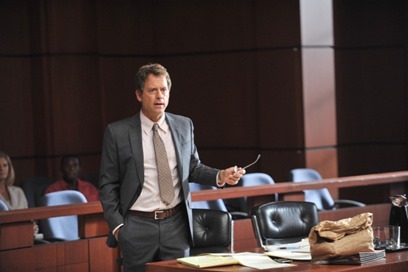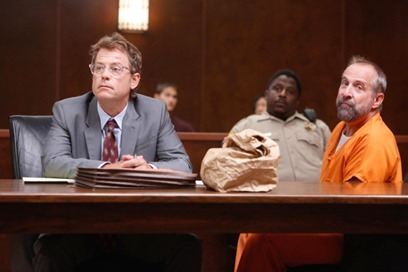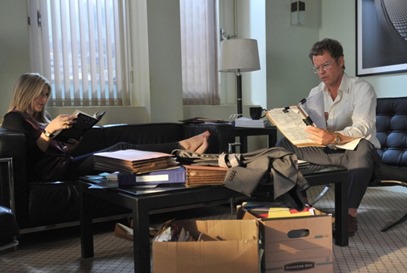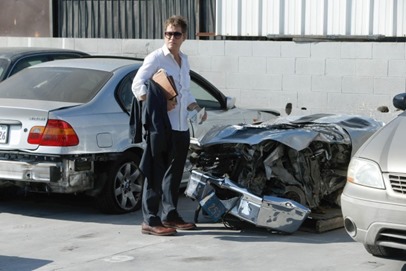Rake’s (Fox Thursdays, 9/8C) Keegan Deane is charming, intelligent, and a lousy gambler but he tends to get too involved in situations that cannot go well for him: he owes his bookie; his office manager/secretary/general assistant is about quit over back pay, and his latest client has paid him in tuna (well, with a tuna). His best friend has told him he can’t crash on the couch anymore.
Greg Kinnear – who is also charming, intelligent, and (and at least according to him) a lousy gambler, but otherwise not much Deane – talked with a group of journalists/bloggers yesterday about his new Fox series. He was excited about the show and his role as defense attorney Keegan Deane – a type of character he’s never played before.
Hey, how are you? I’m calling from Chicago here.
Greg Kinnear: Hi.
I want to ask you, how are you similar to this character?
Greg: How have I what?
How are you similar to this character, how did you relate?
Greg: We’re both horrible gamblers. The most obvious connection is that I have no skills in that department and he seems to be tortured by his own lack of ability as well. But, I don’t know, I mean, similarities; the truth is I don’t know that there’s a lot. I think it’s what really attracted me to the character when I saw the Australian show and kind of the zone they were playing in, not only the ensemble nature of the show, but just this, Keegan himself with the inability to not get out of his own way and his kind of needs and wants and addictions all sort of snowballing around him constantly and just that notion of two steps forward, three steps back seemed like a fun zone to play in.
Not that I don’t have my own little bag of self-destructive traits. We all do, but he has them in such a flawless rate, such an ease of his ability to miscalculate and to set off little personal landmines around his life so regularly that it really seemed like a fun area to play around in. I hadn’t played an attorney before so one that was dealing with that kind of world seemed like a great plan.
So, watching this role it just seems to me and strikes me – and I’ve talked to several other TV people about this – it just seems like such a Greg Kinnear character and I think that’s more like a testament to your charm than a suggestion of it being typecast or anything like that. It just seems to work so well, which is a positive thing I hope.
But can you talk a little bit about as an actor what that’s like, whether it’s a little frustrating at times; I don’t know if it’s comforting or annoying that people look at it as, yeah, that’s Greg Kinnear being Greg Kinnear. Does this mean that’s Greg Kinnear at his best to you or does that mean that’s Greg Kinnear not putting as much work into it as he probably really is.
Greg: Well, I can’t really drill down too deep on other people’s perceptions of myself. I felt like in terms of my interest on this particular role that it would be fun to play, that it would be something that could evolve and something that might be a nice starting point in an onward journey and where it will go and what will happen specifically to the guy, obviously we’ve done a lot of conversations, Peter and I, about what that is.
But, yeah, I don’t know what a Greg Kinnear role looks like or is. I guess if I do the role then it is that. But this didn’t feel; obviously, I’m not playing a junkie. I don’t think that there’s a, at least in the starting place of who this guy is and my hope for what he can be, I was attracted to it and wanted to do it because of what I saw on the page and less about how I could define or redefine people’s perception of me. So, that was just not the mandate here.
My question for you, as you just mentioned you never played an attorney. Hollywood has some pretty notorious, well, a lot of cities, including Chicago, has a lot of notorious attorneys. Did you bone up a little bit on some sort of edgy characters to try to work some of that into creating this guy?
Greg: Well, specifically defense characters, there’s quite a pantheon of very, very colorful types in this world, both men and women. And, you know, there’s an inherently despicable rap that I think defense attorneys get as the defenders of people, particularly people that we all recognize as guilty or think are guilty. And yet, they’re an essential part of the balance of justice.
And I guess we won’t be doing a lot to undespicasize – I don’t know the word; I would have to go to Google and see if we can undespicable something – I don’t know that we’ll be doing a lot with this role to champion people’s perceptions of defense attorneys.
Listen, I mean there is a gambling element to being somebody who is going to take on the job of constantly trying to represent and prop up people who might be somewhat shady. And that notion of that is probably part of how they got the rap, but I think it’s to try and find the balance of being colorful, being at times despicable, but also being somebody who does believe in something.
We’re on episode 10 now and there have been cases where there are people who for sure the audience is going to want to not be found innocent and at times they are and at times they’re not. I think the real cool thing about the show is most of the people I represent are guilty and the truth is that’s the way it is in the system. If you’re innocent or there isn’t enough seriously compelling evidence to put you up against the state, chances are it’s never going to go to trial and, of course, trial is where all the fun stuff happens.
So, we do some cases that go to trial. But we also do cases that all are negotiated in back rooms and sort of quietly handled between people negotiating. And that’s another kind of cool aspect of the show. But there are colorful characters in this world. I’ve seen many of them and they’re a treat to watch.
I haven’t seen anybody quite like this guy, but I’m looking.
I was just wondering how much will this version of the show borrow from the original Australian series?
Greg: Yeah, that’s a good question. Well, listen, in terms of its format, one of the most significant changes that we’ve had to embrace is being on a network where I think we have 43 minutes or 44 minutes or something like that and Peter’s Australian show was like 58, 59 minutes and that time change has been a real difficult sort of readjustment that has been something we’re conscious of.
Obviously, in an Australian show you always had kind of a case, sometimes more significant one week, sometimes less significant another week, which is still the tempo we follow here. But you can’t really reduce down the case. The case is going to be the case, so what ends up being compromised is the additional time to deal with the sort of orbital world of these pivotal characters in my life and my life and their lives, which is one of the coolest things about the show I think is the ensemble element of it.
We worked really hard to cast great actors in this ensemble. I think they’re all excellent. And that aspect has really come up in the last few shows. It starts a little Keegan-centric as the show kind of starts, but it really evolves and you get to know all these characters a lot more. But there are limitations just with time. As far as the cases, sometimes there is some stuff that we have taken from the Australian show, some of the cases, some of the story lines.
But I would say a lot of it is its own thing and has kind of organically found its own place. So, I don’t know what the percentage would be to give you for that, but maybe 30%, 40% kind of comes from the Australian show, but I think the rest of it feels very different. So, I feel like the balance is good.
Believe me I wanted to do a nice tip of the hat to the Australian show because I really admired it, but, obviously the hope is for all of us to try to find our own DNA and kind of develop our own vibe here.
Hey, Greg. Thanks for talking to us today.
Greg: Hi, how are you doing? Very 21st Century man, this is 2014 year floating out here in this electronic bubble with calls coming in from PanSTARRS-1. I’m digging it.
Yeah, it’s pretty new. So, since becoming a part of this show how has your view of the court system changed?
Greg: Well, as I said earlier and I think it’s true, I never really had considered how; I had just always assumed that people who might have gotten themselves into some sort of legal entanglement would eventually sit before a jury and kind of go through this whole sort of straightforward, very clean process of justice.
And I think what the show has done, because we have lawyers working on it and just through conversations and just through stories that we work on, the truth is that you learn that there is not a straight through line on any of these cases, that they’re all varied. Many of them never go to trial or the ones that do have a whole different expectation than the ones that don’t in terms of the outcome and how they’re negotiated.
So much of the process seems inconsistent to me. And, obviously, I don’t think it’s a bad thing. Maybe it’s a reason that the legal world has over the years had so many films and television shows about it. There’s just a great sort of imbalance to the process, an imbalance to the outcome and justice is not always served fairly for sure. That’s been made very clear talking to a lot of the guys we have access to and we try and represent that fairly in the show I think.
I know that you’re a guy who likes to work a lot and I was wondering, as you survey your career at this point in your life whether you see the landscape as having more interesting possibilities than you expected or compared to a few years ago how you sort of view the landscape as you make the sort of decision to do this series and the kind of things you’re being offered.
Greg: Well, I don’t know if I concede your point that you know I’m a guy who likes to work a lot. We may have to have some debate about that. And I think a lot of times just by the nature of; I guess I’ve done a lot of movies, but a lot of them aren’t leads, the roles that have demanded enormous amounts of time. And so, I guess an illusion might be that that’s always the case, but you know, it’s been a balance of work, for sure, that I’ve enjoyed.
This show and these shows are, obviously, there’s a lot of work, particularly starting out, as I said earlier, the show is very focused on my character before we start to bring in Miranda and John Ortiz and David Harbor and all these other great actors. But I think, it’s no different than any aspect at any other time in my life in the sense that they’re not really a great blueprint for what to expect from one job to the next.
This was attractive in the sense that it was a fairly contained series order and we’re doing 13 and so to build a story line of my guy and the people around him in 13 episodes felt like there’s something manageable about that and with an end date in sight, which is fast approaching. So, beyond, I don’t know what will really happen. Other opportunities are always hard to speak to, but I’m enjoying the show. It’s been a blast and I’m getting to work with some excellent people. So, I guess from that standpoint it’s all good.
The thing that I found most fascinating about the pilot, besides having such amazing guest stars, I mean, Peter Stormare is amazing; it’s a Sam Raimi thing you can tell because the banter and the dialogue are so beautifully put together and I’m just wondering are the seven scariest words in Keegan’s life, “This is going to be a conversation?” And if so, why?
Greg: Well, they’re certainly the seven scariest words in Ben’s life, played by John Ortiz because it’s coming from his wife. You know, I don’t know. I don’t know that those are the seven scariest words for Keegan. I think that he thrives on conversation. I think dialogue and words are not; he doesn’t use an economy with them and I think our writers are really good at keeping that vibe alive here. At any given moment me, at least my character, in particular, is spinning a lot of plates and words prop him up.
And I saw it in the Australian show. They had a real, you know, Peter Duncan and what those guys had done down there had a really nice balance of stuff going on, but really I thought their management of language was really cool to watch. And it’s been fun on this show as well.
And, by the way, Sam, I worked with Sam a few years ago in a movie and I was very nervous. We were doing the show and we didn’t have a director for the pilot and I was so terrified. I’m friends with Sam, but I really didn’t know if that was crossing a line and my wife was the one who said, you know what, just ask him. All he can do is say no. And I asked him and he read the script and he loved it and, in fact, has gone on and done another show for us and helped us with some other pieces along the way and has really become an ally to Rake and I’m grateful to that because, obviously, he’s my friend, but he’s also just I think a great artist and I think the show has some cool colors in it that have, like Peter Stormare and like Sam, and its early incarnation attracted some really smart people, so I’m grateful for that.
Well, thanks so much for doing this and the pilot is amazing. It is easily a match for the first episode of the Australian series, so thanks very much for that.
Greg: Thank you very much.
Photos by Richard Foreman/Courtesy of Fox



